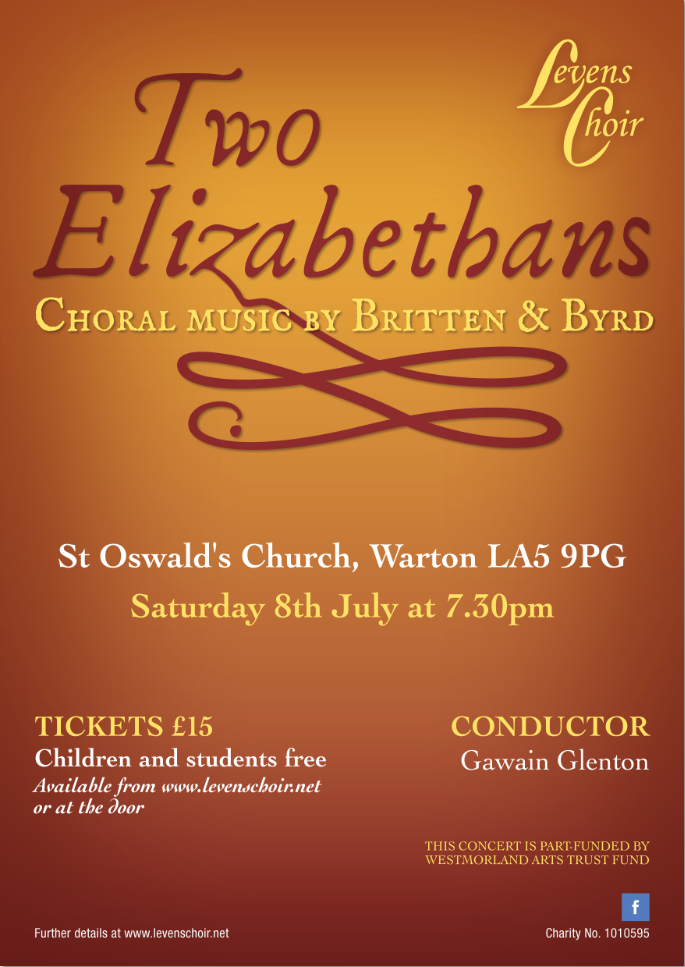Two Elizabethans - choral music by Britten & Byrd
 The latest performance by the Levens Choir under the direction of Gawain Glenton featured music by two composers separated by four centuries, William Byrd (1543-1623) and Benjamin Britten (1913-1976). The entirely unaccompanied concert in the acoustically-splendid St Oswald’s Church, Warton, was very well attended by an appreciative audience who were given a virtuoso display of choral music of the highest quality.
The latest performance by the Levens Choir under the direction of Gawain Glenton featured music by two composers separated by four centuries, William Byrd (1543-1623) and Benjamin Britten (1913-1976). The entirely unaccompanied concert in the acoustically-splendid St Oswald’s Church, Warton, was very well attended by an appreciative audience who were given a virtuoso display of choral music of the highest quality.
The evening began with Byrd’s 1590 anthem ‘Sing Joyfully’, a text drawn from Psalm 81; a bright, cheerful start with clear notes and harmonies and lovely dynamics. We then moved on to the first two parts of Byrd’s Mass for Four Voices, the Kyrie and Gloria - a more measured pace with strong base lines in the Gloria underpinning the harmonies and the alto section shown off to good advantage in this classic Tudor Renaissance piece.
Glenton cleverly split the Mass here, interposing Britten’s Advance Democracy, giving a huge contrast to the previous works. This dramatic warning of the gathering war clouds in Europe (written in 1938) uses melismatic sections laid over abrupt, jackboot-like utterances from the other voices and switches from major to minor keys bringing a feeling of threat and danger.
We then went back to Byrd’s Mass for the Credo and the perfect counterpoint to the horror of war. The sharp harmonies were particularly well shown by the sopranos in this expression of the spirit of faith with the tenors lending fulsome support.
The first half concluded with a rendering of Britten’s Five Flower Songs (op 47 of 1950). This song cycle, with elements of Elgar and Parry, provided the choir with a real challenge to which they rose magnificently. The contrast between the light touch required for To Daffodils to the almost menacing, slightly discordant harmonies of Marsh Flowers and the lyrical The Evening Primrose were handled with aplomb.
The second half began with Britten’s Deus in Adjutorium, his setting of Psalm 70 written in 1944-5 for a radio play. A rousing opening piece, delivered crisply and with precision. The sopranos were particularly prominent and the central canon was expertly performed.
Then came perhaps the best-known work of the evening, Byrd’s gorgeous Ave Verum Corpus. He wrote this in about 1605 but the original dates from the 13th century. The rich harmonies rang through the delightful acoustics of St Oswald’s with great balance and clarity. A quite superb rendition.
Then came, for your reviewer, the pièce de résistance of the evening; Britten’s A Hymn to the Virgin. Written when the composer was only 16, this minor masterpiece is a dialogue between two sections of the choir, one singing in Latin, the other in English. Glenton split the singers to opposite ends of the church; simple but magically effective. Absolutely divine.
The concluding two parts of the Mass for Four Voices then followed, the Sanctus and Agnus Dei, with the full choir together again and in full voice. Despite the relative small number of male voices in the choir the balance was perfect, well shown in these pieces. The finale of the Agnus was quite beautiful.
Two short Byrd compositions followed; Even from the Depth, from Psalm 130, written about 1558, and Look Down O Lord, from 1614 - the latter from a collection entitled ‘In the teares or lamentacions of a sorrowfull soule’. Delightful cameos perhaps reflecting Byrd’s more introspective nature.
Which set us up for the grand finale - Britten’s Hymn to St. Cecilia, op. 27, based on Auden’s poem. The choir supported the excellent soloists (Lucy Crispin, Sally Dickens, Rose Jones, John Ward and Charlie Lewis) in this tribute to the patron saint of musicians (Britten was born on St. Cecilia’s day) to bring the wonderful evening to a rousing close, reflected in long and appreciative applause.
Steve Porter, 10 July 2023


